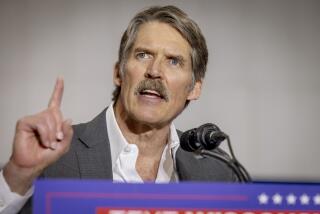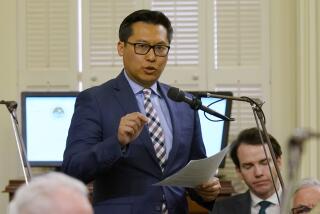Johnson, Feingold seek to redefine themselves in rematch
- Share via
RICHLAND CENTER, Wis. — Democrat Russ Feingold isn’t the incumbent in Wisconsin’s Senate race, and he wants voters to know it.
Even though he served 18 years in the Senate before losing to Republican Ron Johnson in 2010, Feingold is shaping his comeback and rematch bid against Johnson as if it’s his first run for office.
He wants to be called Russ. He’s not emphasizing achievements that made him a hero to liberals, like casting the lone vote against the Patriot Act. Instead, the 62-year-old Feingold spent the 101 days since he formally announced his campaign quietly visiting all 72 Wisconsin counties to meet with voters in small settings so he could reintroduce himself.
“An election should be about what’s happening today and the future, instead of living in the past,” Feingold told reporters after meeting with a group of University of Wisconsin students who weren’t old enough to vote the last time he was on the ballot.
The contest is critical to Democratic hopes of recapturing majority control, and they would seem to have the edge considering the election comes in a presidential year in a state that hasn’t backed a Republican’s White House bid since Ronald Reagan.
Johnson and other Republicans have gone on the offensive with more than a year to go before the election, calling Feingold a hypocrite for breaking a 1992 pledge to take the majority of campaign donations from Wisconsin donors.
Feingold, who co-authored the McCain-Feingold campaign finance law designed to limit the influence of special interest money, says that doesn’t make sense in the wake of the Citizens United ruling that altered the campaign finance landscape by legalizing large, undisclosed contributions.
Republicans say Feingold is not the youthful maverick who first ran in 1992 with a series of memorable and quirky campaign ads where he wrote promises on his garage door and opened his closet door and said, “Look. No skeletons.”
Instead, they highlight the more than $100,000 Feingold has made on the speaking circuit since he left the Senate.
Johnson, 62, is hustling to combat his own serious vulnerabilities, including low name recognition. He is defending his blunt approach and tweaking his delivery to address concerns even among Republicans that he comes off as somewhat brusque.
His bluntness got him in trouble in July when he referred to “idiot inner-city kids” while criticizing liberals on school choice. A spokeswoman was forced to defend him, arguing that he was being sarcastic and the senator backed equal opportunity in education.
Johnson, too, has traveled to all 72 counties — doing it in just 42 days this summer. Johnson said he has hosted 43 telephone town halls where half a million people have dialed in.
While he’s dropped his usual formal PowerPoint demonstration to lay out problems he sees facing the country, Johnson remains unapologetic about his approach.
“I get accused of lecturing, but I call it providing information,” Johnson said at a recent town hall meeting in rural Richland Center that attracted about two dozen people.
Both men are running against history.
For Johnson, no Republican senator in Wisconsin has been elected in a presidential year since 1980.
For Feingold, only two senators nationwide since 1956 have won their old seat back after losing re-election. And it’s been even longer — 1934 — since someone beat the same person who knocked them out of office.
A Marquette University Law School poll in August suggested difficulty ahead for Johnson. After five years in office, 38 percent of voters still don’t know enough about Johnson to form an opinion. Of those who do, only 30 percent view him favorably compared with 47 percent for Feingold.
“Trust me, it’s not because I haven’t been out there,” Johnson said. “Any time I’ve got, we’re pounding the state, all four corners.”
Feingold’s campaign emphasizes his support for raising the minimum wage, while Johnson opposes it. And Feingold, who has held a series of meetings with young voters on college campuses across Wisconsin, sees an opportunity on student loan debt.
He supports allowing students to refinance their loans, increasing spending on Pell grants and on federal funding for higher education, while Johnson opposes federal government involvement with student loans.
Outside groups are trying to influence the race.
The conservative Restoration PAC spent $500,000 on television spots this summer touting Johnson’s opposition to the Iranian nuclear arms deal, which Feingold supports.
But another heavyweight conservative PAC, American Crossroads, said last week it hasn’t decided whether to commit money to the race.
___
Follow Scott Bauer on Twitter at https://twitter.com/sbauerAP
Copyright 2015 The Associated Press. All rights reserved. This material may not be published, broadcast, rewritten or redistributed.
More to Read
Sign up for Essential California
The most important California stories and recommendations in your inbox every morning.
You may occasionally receive promotional content from the Los Angeles Times.












